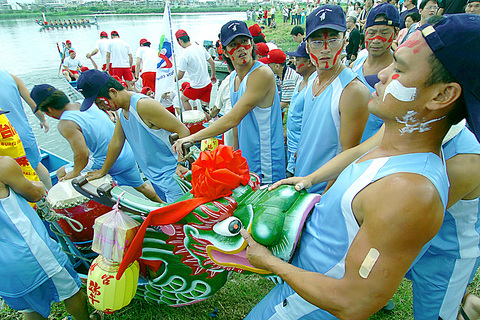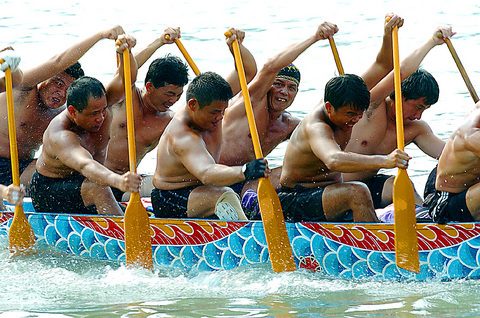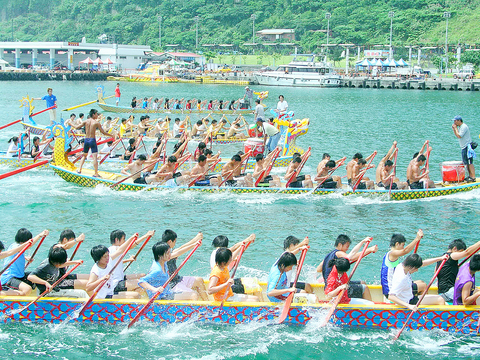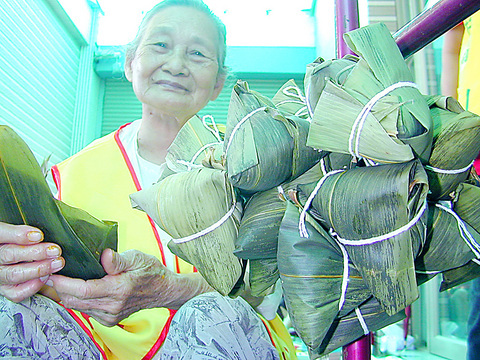The hugely popular annual dragon boat races will be the focus of a series of festivities nationwide this weekend, when hundreds of teams from across the country and a dozen international squads take to rivers in the Taipei, Bitan, Kaohsiung, Tainan, Ilan and Lukang in celebration of Duanwu Festival (
Falling on the fifth day of the fifth lunar month, Duanwu, or Dragon Boat Festival as it is more commonly known in English, can be traced back over 2,000 years to the death of the poet and respected bureaucrat Chu Yuan (
Legend has it that Yuan, a trusted adviser to the Chu emperor during the Warring States period (475 BC to 221 BC), was

discredited by a group of jealous and scheming rivals. Unable to regain the emperor's favor following the accusations of corruption, Chu decided to commit suicide by drowning.
Clasping a heavy stone to his chest Chu flung himself into the raging river. News of Chu's suicide shocked the nation and upon hearing it citizens leaped into their boats in an attempt to save him. They arrived too late, however, and Chu met his end in the waters of the Milo River in Hunan Province.
The beating of drums and the splashing of oars that are now such an integral part of the dragon boat races today are meant to mimic the frantic search for Chu.

The legend may be a couple of thousand years old, but Taiwan's dragon boat races are a mere 120 years old. They have become hugely popular and if the weather remains sunny, then the combined attendance figures for the nation's half dozen races is expected to number well into the hundreds of thousands.
This year over 500 teams will participate, both for fun and competitively. Smallscale races will be held in Ilan and Lukang and larger races will take place in Kaohsiung and Tainan.
A total of 88 teams will be competing in Kaohsiung and pitting their strength against each other on the Love River (

While The races outside of Taipei promise to be entertaining and competitive affairs, it is the Taipei City Government sponsored President's Cup that is once again expected to draw the largest crowds and the lion's, or rather the dragon's share of media attention.
Organized by the Education Department of Taipei City Government (
This year over 2,000 individuals representing a total of 111 teams will be competing in the Taipei City Government sponsored event. The first round of races will take place from 8am until early afternoon today. On Saturday races will again begin at 8am and will continue until 6pm and on Sunday those teams still in with a chance to raise the Presidents Cup will race from 8am until early afternoon.

Divided into two categories -- competitive and civil -- and subdivided into over a dozen small divisions, the President's Cup attracts a good mix of both competitive and less competitive teams. Each team, regardless of its will or ability to win, comprises 18 rowers, one coxswain and a drummer.
The largest and most cutthroat division is the Men's Open. Featuring top international teams from the US, the Philippines, Japan, Nepal and Hong Kong as well as Taiwan's top seeded competitors -- the Taipei Physical Education College (
Not all of the teams take it quite a seriously as those from the two highly competitive institutes of higher learning and the semi-pros from overseas. For John Nixon and his Taipei European School team participating in the annual event is more important than winning.

PHOTOS: TAIPEI TIMES
"I think what's nice is the mixture of staff, parents and older kids who make up the team," Nixon said. "We do take it seriously and we do like to win, but it's the taking part that is really more important than anything else."
Regardless of where the race's more serious contenders hail from, many have been preparing for the occasion for quite sometime.
"We started practicing twice a week in mid-April. I'd say that this year we are more focused in our will to win. We've put our maximum into it and the intensity is much higher," said Jim Stokes of the Canadian Society dragon boat team. "The key is coordination and we'll try to stick with the pace of the drummer and go with the beat of the drums."
Competitors unlucky enough to fall into the water are unlikely to drown as organizers always ensure that there are plenty of safety boats in and around the race areas, but as the Keelung River is not known for its cleanliness racers have been advised to take care.
Should a rower find him or herself in the drink medical staff will be on hand to assist. Rowers with open wounds or burst blisters are encouraged to seek medical treatment as soon as they reach dry land to ensure that wounds do not become infected.
While the 111 teams competing in Taipei have been made aware of the health hazards of the Keelung River, few have taken the same extreme precautions as those employed by the Taipei American School team.
Coached by Australian Peter Clark, whose guidance helped Nathan Baggaley secure two silver medals for the Australian Olympic kayaking team in Athens last year, the team has taken the seemingly strange precaution of learning to paddle without splashing.
"We're all aware of the state of the river and we've seen dead rats float past. The water isn't [clean] and you don't want to get any on yourself or on your teammates," Clark said. "The team had to learn to paddle without splashing. It's not a [method] I would have chosen to teach the team, but it has enabled us to become technically correct and I think it will work in our favor."
Those teams competing in Taipei County's Congressional Cup (
Wherever you choose to attend, the annual Dragon Boat Festival is more than just a day at the races for the hundreds of participants and thousands of spectators. It's a chance to eat, drink and make merry along the banks of some of Taiwan's most picturesque and several of its not so charming rivers.
Along with cheering for favorite teams, as they pit their rowing prowess against the currents, the pollution and the wind, visitors will be treated to performances by local musical acts and theatrical groups. And, as with any Chinese festival, food is an integral part of the day out at the dragon boat races.
Dozens of food stalls will be on hand and selling everything from the traditional zongzi (

Taiwan has next to no political engagement in Myanmar, either with the ruling military junta nor the dozens of armed groups who’ve in the last five years taken over around two-thirds of the nation’s territory in a sprawling, patchwork civil war. But early last month, the leader of one relatively minor Burmese revolutionary faction, General Nerdah Bomya, who is also an alleged war criminal, made a low key visit to Taipei, where he met with a member of President William Lai’s (賴清德) staff, a retired Taiwanese military official and several academics. “I feel like Taiwan is a good example of

March 2 to March 8 Gunfire rang out along the shore of the frontline island of Lieyu (烈嶼) on a foggy afternoon on March 7, 1987. By the time it was over, about 20 unarmed Vietnamese refugees — men, women, elderly and children — were dead. They were hastily buried, followed by decades of silence. Months later, opposition politicians and journalists tried to uncover what had happened, but conflicting accounts only deepened the confusion. One version suggested that government troops had mistakenly killed their own operatives attempting to return home from Vietnam. The military maintained that the

Before the last section of the round-the-island railway was electrified, one old blue train still chugged back and forth between Pingtung County’s Fangliao (枋寮) and Taitung (台東) stations once a day. It was so slow, was so hot (it had no air conditioning) and covered such a short distance, that the low fare still failed to attract many riders. This relic of the past was finally retired when the South Link Line was fully electrified on Dec. 23, 2020. A wave of nostalgia surrounded the termination of the Ordinary Train service, as these train carriages had been in use for decades

Lori Sepich smoked for years and sometimes skipped taking her blood pressure medicine. But she never thought she’d have a heart attack. The possibility “just wasn’t registering with me,” said the 64-year-old from Memphis, Tennessee, who suffered two of them 13 years apart. She’s far from alone. More than 60 million women in the US live with cardiovascular disease, which includes heart disease as well as stroke, heart failure and atrial fibrillation. And despite the myth that heart attacks mostly strike men, women are vulnerable too. Overall in the US, 1 in 5 women dies of cardiovascular disease each year, 37,000 of them